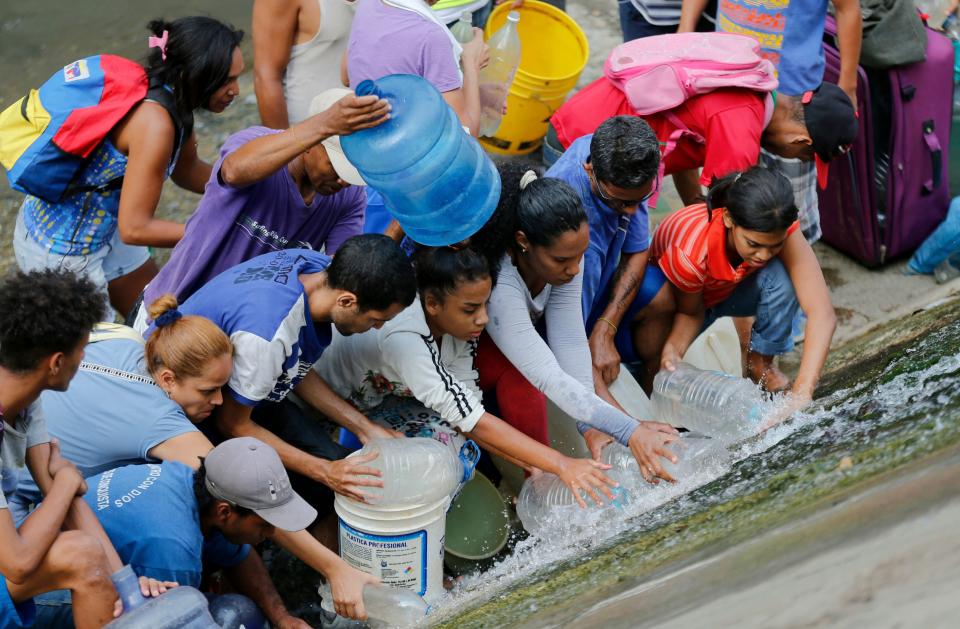Power out, water scarce, looting: What is Trump administration's next move in Venezuela?

WASHINGTON – Looting is rampant. Clean water is running low. Mass blackouts continue. And the potential for political violence is ever present.
That is the quickly deteriorating situation in Venezuela – where Nicolas Maduro clings to his presidency despite massive American and international pressure for his ouster.
In Washington, top Trump administration officials sharpened their rhetoric and hinted at a more aggressive posture. Democratic lawmakers prepared a proposal that would bar President Donald Trump from any military intervention without congressional authorization – fearing that such a step is in the works and that it would be disastrous.

“The situation in Venezuela has gotten considerably worse in the last week,” said Brett Bruen, a former foreign service officer stationed in Venezuela and a global engagement adviser in the Obama administration. “It’s gone from alarming to catastrophic, so that requires a reassessment of what our policy is.”
Thursday marked the seventh day of Venezuela’s mass power outage – which has exacerbated the crisis for Venezuelans coping with food and medicine shortages. Without power, hospitals have been unable to help the sick and dying, water pumps have stopped working, and vandals have ransacked stores and other businesses, according to media reports.
China offered to come to the rescue of Maduro's socialist government, which has been unable to fix the power grid and is increasingly isolated internationally.
“China is deeply concerned about this,” Foreign Ministry spokesman Lu Kang said in Beijing on Wednesday. “China is willing to provide help and technical support to restore Venezuela’s power grid.”
Citing the dire conditions, the State Department withdrew all its American Embassy staff from Venezuela this week. American officials expressed alarm at Maduro’s call Monday for armed gangs, known as “colectivos,” to rise up and fight the political opposition. The Trump administration has recognized opposition leader Juan Guaido as the legitimate president of Venezuela and labeled Maduro a corrupt usurper.
“I call on the colectivos,” Maduro declared, according to The Washington Post. “The hour of resistance has arrived.”
“That’s calling for armed gangs to take over the streets, and it is obviously going to be a great worry to Venezuelans,” Elliott Abrams, the Trump administration’s special envoy for Venezuela, said during a State Department briefing Tuesday. “Perhaps it is a sign of Maduro’s lack of confidence in his own security forces. But it is by definition a breakdown of law and order.”
Abrams and Secretary of State Mike Pompeo suggested this week that the Trump administration was preparing to increase pressure on Maduro. In his announcement that all American diplomats would leave Venezuela, Pompeo said their presence on the ground was a “constraint on U.S. policy.” The secretary of state did not elaborate, but the remark fueled speculation of military intervention.
Abrams said the administration would impose “significant” new sanctions on Venezuela in the coming days. He declined to say whether the Trump administration asked the Pentagon to draft military options.
Michael Dobson, a former senior sanctions policy adviser at the U.S. Treasury Department, said the United States is running out of economic tools to squeeze Maduro. The administration has slapped sanctions on the country’s oil sector, which is by far its largest source of revenue. Dobson said the Treasury Department could look at restrictions on Venezuela’s gold industry and some other minerals.
“But beyond that, there isn’t much left,” said Dobson, an attorney in Washington. “So it’s largely a waiting game to see, will the military recalculate and see that it’s no longer worth having Maduro in the chair?”
Democrats fear the Trump administration isn’t interested in waiting. Wednesday, the House Foreign Affairs Committee heard testimony about the implications of U.S. military intervention in Venezuela.
“Military intervention would be much more difficult than many believe,” Rebecca Bill Chavez, a former deputy assistant defense secretary for the Western Hemisphere, told the committee.
Democrats warned against any military action without congressional authorization.
“We all agree the Maduro regime has destroyed Venezuela’s economy, starved its people and engaged in widespread corruption and repression,” said Rep. David Cicilline, D-R.I., the lead sponsor of legislation that would bar the administration from spending any money on military action in Venezuela.
“Not only would military intervention be illegal, it would also come with serious consequences that I fear would not only hurt the Venezuelan people, but also the prospects for democracy,” he said.
More: Americans should consider fleeing Venezuela as new sanctions loom, State Department says
This article originally appeared on USA TODAY: Power out, water scarce, looting: What is Trump administration's next move in Venezuela?

